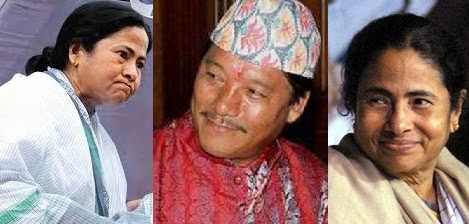The Darjeeling district CPI-M has started campaigning against the Trinamul Congress by highlighting the ‘double role chief minister Mamata Banerjee has been playing with the Gorkha Jan Mukti Morcha’ (GJMM) and why she was silent when the GJMM supported BJP's Jaswant Singh in the Darjeeling Lok Sabha seat in 2009.
"Jaswant Singh, who was elected with the support of the GJMM from Darjeeling in 2009, was the supporter of Gorkhaland. But the Trinamul Congress did not comment on the subject in any news paper from 2009 to 2011," the CPI-M says in a booklet titled 'Condition of Trinamul's Switzerland.'
"Not only that, the Trinamul Congress prompted the GJMM to continue with its movement and this was clear when it made an electoral alliance with the GJMM in the last Assembly elections," the booklet says.
The CPI-M leadership also points out to why Miss Banerjee came down heavily on GJMM chief Bimal Gurung on the issue during her recent election campaigning in north Bengal.
"Had the GJMM extended support to the Trinamul, Mamata Banerjee would have not come down heavily on the party at Gorubathan yesterday. Since the GJMM decided to stand by their decision, she started criticising it, fearing a loss in the Darjeeling LS seat," former state urban development minister Asok Bhattacharya said today.
In the booklet, the CPI-M mentions the number of railway projects that were taken up when Miss Banerjee was railway minister, and the present position of those projects in north Bengal, including Darjeeling Hills and Siliguri.
A comparative study on the Trinamul Congress' manifesto in 2009 was published in the form of questions and answers, where the CPI-M was critical on the non-implementation of some proposals.
The CPI-M even criticised the Cabinet meeting at Uttarkanya, the north Bengal secretariat, and the decisions taken there on various issues, including employment in the North Bengal State Transport Corporation and settlement of encroachers in Jaigaon.
The corruption in the Siliguri Jalpaiguri Development Authority and the role of the state government in tea plantations have also been highlighted in the booklet.
Source: thestatesman
 |
| CPM highlights Mamata's 'double role' with GJM |
"Not only that, the Trinamul Congress prompted the GJMM to continue with its movement and this was clear when it made an electoral alliance with the GJMM in the last Assembly elections," the booklet says.
The CPI-M leadership also points out to why Miss Banerjee came down heavily on GJMM chief Bimal Gurung on the issue during her recent election campaigning in north Bengal.
"Had the GJMM extended support to the Trinamul, Mamata Banerjee would have not come down heavily on the party at Gorubathan yesterday. Since the GJMM decided to stand by their decision, she started criticising it, fearing a loss in the Darjeeling LS seat," former state urban development minister Asok Bhattacharya said today.
In the booklet, the CPI-M mentions the number of railway projects that were taken up when Miss Banerjee was railway minister, and the present position of those projects in north Bengal, including Darjeeling Hills and Siliguri.
A comparative study on the Trinamul Congress' manifesto in 2009 was published in the form of questions and answers, where the CPI-M was critical on the non-implementation of some proposals.
The CPI-M even criticised the Cabinet meeting at Uttarkanya, the north Bengal secretariat, and the decisions taken there on various issues, including employment in the North Bengal State Transport Corporation and settlement of encroachers in Jaigaon.
The corruption in the Siliguri Jalpaiguri Development Authority and the role of the state government in tea plantations have also been highlighted in the booklet.
Source: thestatesman






Post a Comment